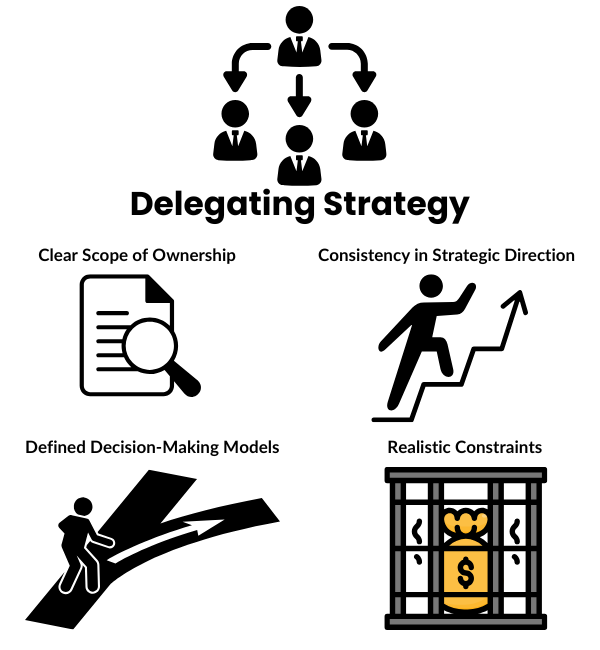Managing an engineering team is like building a plane while flying it—deadlines don’t pause, priorities shift, and managers must keep their teams productive while tackling real-time challenges.
In this episode, Eddie Fisler, Head of Product Engineering at Lob, shares how frontline engineering managers (EMs) can balance execution, delegation, and strategic thinking. Instead of just keeping projects moving, great managers own their domain, structure their teams effectively, and ensure long-term success.
So how can frontline managers lead instead of just overseeing? How do they delegate without losing control? And how can senior leaders support them without micromanaging? Let’s dive into Eddie Flaisler’s approach to frontline engineering leadership.
The Role and Success of a Frontline Engineering Manager
Many assume an engineering manager’s job is just tracking progress and ensuring deadlines are met. However, according to Eddie Flaisler, an EM’s role is much deeper—it’s about balancing execution, retention, and team efficiency under constant constraints.
What Defines a Strong Frontline Manager?
Great EMs don’t just manage tasks—they build systems that drive success. Instead of reacting to issues as they arise, strong managers take ownership of their teams’ long-term health and productivity.
A successful EM:
- Creates an environment where engineers thrive.
- Ensures work delivers real business impact.
- Structures teams to prevent burnout and keep talent engaged.
Key Challenges Every EM Faces
1. Understaffing & Resource Constraints
- Teams are always stretched thin, yet expectations never slow down.
- Companies often under-hire, assuming managers can stretch their teams further.
2. Lack of Leadership Training for Engineers
- Engineers may be experts in coding but not in leadership, communication, or urgency.
- Remote work adds complexity—keeping teams connected on Zoom requires a different skill set.
3. Balancing Business Needs with Engineer Motivation
- Engineers want exciting projects, but businesses also need maintenance, bug fixes, and infrastructure upgrades.
- Keeping engineers motivated while ensuring they contribute to business goals is an essential EM skill.
How Leadership Supports EMs
Senior leaders shouldn’t micromanage but ensure EMs are solving the right problems. Eddie Flaisler’s approach to leadership includes:
- Helping managers stay focused on high-impact work.
- Providing support for team challenges without taking over.
A strong frontline EM isn’t just an executor—they make key decisions, structure their teams effectively, and ensure long-term success.
How EMs Can Take Ownership of Strategy
Many companies assume strategy comes from executives, while frontline managers are just there to execute. But Eddie Flaisler argues that great EMs don’t just follow orders—they take ownership of how their teams solve problems.
Instead of waiting for top-down direction, EMs should:
- Define the biggest problems within their domain.
- Align team goals with business priorities.
- Ensure engineers aren’t just coding but solving high-value challenges.
Senior leaders should provide direction, not control. The best EMs don’t just focus on day-to-day execution—they shape how their teams contribute to long-term business success.
Delegation: The Final Step, Not the First
New managers often assume delegation means handing off tasks. But Eddie Flaisler argues true delegation only works if the foundation is solid.
Why Most Managers Struggle with Delegation
Many managers struggle to delegate because their teams aren’t set up for success. If roles are unclear or decision-making is chaotic, delegation turns into micromanagement.
To delegate effectively, managers must first ensure:
- Clear team roles—everyone knows their ownership areas.
- Defined decision-making models—who decides what, without constant debates.
- Stable processes—so engineers can take full responsibility for their work.
Without these, managers keep pulling tasks back onto their plate, getting trapped in execution instead of leadership.
How to Delegate Without Losing Control
Eddie Flaisler shares a structured approach to distributing responsibility:
- Scrum Masters handle workflows—keeping projects organized and reducing chaos.
- Tech leads mentor junior engineers, spreading leadership across the team.
- Product Partners bridge engineering and business needs—so engineers don’t work in isolation.
Instead of one manager overseeing everything, responsibility is distributed, making teams scalable, independent, and more effective.
Strategy vs. Execution: Helping Frontline Managers Prioritize

Strategy isn’t about perfect solutions—it’s about making the best possible decision within real-world constraints.
Eddie Flaisler shared a real case study:
- His company had a high-stakes product launch that could generate major revenue.
- The responsible team was underperforming.
- Firing weak performers immediately wasn’t an option due to company instability.
Instead of forcing an all-or-nothing decision, they adopted:
- Delivered an MVP to reduce workload.
- Brought in temporary contractors to accelerate progress.
- Stabilized before making long-term team changes.
The takeaway? Strategy isn’t just about choosing the best path—it’s about balancing priorities with real business challenges.
How Can Insights on Engineering Management Enhance Frontline Leadership in Mastering Strategy?
Insights on engineering management play a crucial role in enhancing frontline leadership by equipping leaders with the skills to effectively navigate complex projects. By embracing engineering leadership for high performance, organizations can drive innovation, improve decision-making, and foster a culture of collaboration, ultimately mastering strategic implementation for lasting success.
Balancing Daily Execution with Long-Term Vision
Many frontline engineering managers feel like they’re constantly putting out fires—fixing urgent bugs, unblocking engineers, and dealing with unexpected requests. The problem? They rarely have time to focus on long-term improvements.
According to Eddie Flaisler, great EMs don’t just react—they plan. Without structure, managers get stuck in short-term tasks, making it impossible to drive real change.
Avoiding the Trap of Constant Firefighting
When managers focus only on immediate problems, they lose sight of long-term impact. To avoid this, they must create systems that allow them to step back and lead.
To break the cycle of reactive work, leaders should:
- Establish clear processes – Reduce daily chaos so EMs can focus on bigger priorities.
- Encourage strategic thinking – Give managers the power to shape how their teams contribute to business goals.
- Limit unnecessary firefighting – Not every issue is urgent; effective managers know when to delegate.
A great manager isn’t just an executor—they build a system where the team works on what truly matters.
Letting Go: Effective Delegation for Frontline Managers
What is one of the biggest struggles for new engineering managers? Letting go.
Many believe they need to personally review every decision, check every pull request, and solve every issue. However great leaders empower their teams instead of micromanaging.
Eddie Flaisler highlights a structured approach to delegation that spreads leadership across the team:
- Scrum Masters manage workflows – Keeping the team on track without the manager overseeing every detail.
- Tech Leads mentor junior engineers – Engineers take ownership of different workstreams, instead of relying on a single tech lead.
- Product Partners align engineering with business needs – Ensuring development efforts match company goals.
This system prevents managers from becoming bottlenecks while developing leadership skills across the team.
Delegating Strategy: The Four Pillars
Delegation isn’t just about tasks—it’s about strategic ownership. Managers should have the freedom to make key decisions, but for that to happen, companies must provide a clear decision-making framework.

Eddie Flaisler highlights four key principles that make strategic delegation successful:
Clear Scope of Ownership
- Teams should know exactly what they own and what they don’t.
- Without clear responsibilities, work slows down due to dependency issues.
Defined Decision-Making Models
- Managers must know who has the final say to avoid endless discussions.
- Without clear accountability, projects get stuck in unnecessary debates and delays.
Consistency in Strategic Direction
- Constant priority shifts kill motivation and disrupt long-term progress.
- If leadership pivots too often, teams lose trust and engagement.
Realistic Constraints
- Engineers need clear limitations on budget, hiring, and infrastructure.
- Without knowing constraints, managers waste time chasing impossible goals.
When these four elements are in place, managers can focus on leadership instead of just following orders.
Conclusion: Key Takeaways for Frontline Managers
Frontline engineering managers aren’t just responsible for completing tasks—they own their team’s success.
- Success isn’t about doing everything—it’s about structuring teams so they work efficiently.
- Delegation is essential—managers must trust their team members and avoid becoming bottlenecks.
- The strategy should be owned by EMs—not just executives.
Eddie Flaisler emphasizes that great EMs don’t just execute—they create systems, empower teams, and optimize for long-term growth.
Want to step into leadership? Start now. Speak up, take ownership, and sharpen your decision-making—because great managers aren’t born; they’re built.




